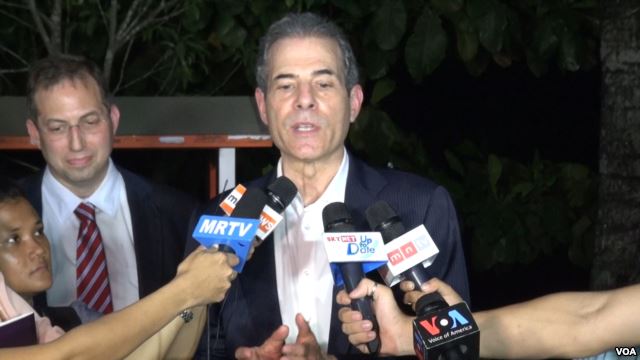BBG Watch Media
With RT and SPUTNIK falling all over themselves to claim an undeserved news organization status for themselves while condemning Broadcasting Board of Governors (BBG) director Andy Lack for pointing out in an New York Times interview RT’s propaganda and disinformation role, we re-post an article about RT published in April 2014 by Richard Stengel, the Under Secretary of State for Public Diplomacy and Public Affairs and a former managing editor of TIME magazine.
Richard Stengel represents Secretary of State John Kerry at BBG board meetings. Kerry is an ex officio member of the BBG.
Richard Stengel wrote last April that “RT is a distortion machine, not a news organization.”
After Stengel published his post in DIPNOTE, U.S. State Department Official Blog, Margarita Simonyan RT’s Editor-in-Chief, went ballistic on him as well. SEE: Who’s really ‘presenting lies as facts’? How State Dept. exposes itself to propaganda, Margarita Simonyan, RT, April 30, 2014.
RT is allowed to broadcast on cable and to negotiate arrangements to place its programs on U.S. stations while BBG-managed Radio Liberty and the Voice of America have been effectively banned by the Russian authorities from having their programs rebroadcast in Russia.
Russia Today’s Disinformation Campaign
DIPNOTE, U.S. State Department Official Blog
POSTED BY RICHARD STENGEL
APRIL 29, 2014
Moscow is subjecting Ukrainians, Russians and the rest of the world to an intense campaign of disinformation that tries to paint a dangerous and false picture of Ukraine’s legitimate government. Russia Today, the Moscow-based TV network financed by the government, is a key player in this campaign of distortion. Along with its Russian operation, RT operates an English-language broadcast out of Washington.
Last week, Secretary of State John Kerry referred to RT as a “propaganda bullhorn,” which was promoting Russian President Vladimir Putin’s “fantasy.” The result was a predictable howl of protest from RT’s editor, who claimed the State Department knows little about what is really happening in Ukraine today and had the audacity to request an apology.
I spent seven years as the managing editor of TIME magazine before joining the State Department. I understand the difference between news, propaganda and opinion. Propaganda is the deliberate dissemination of information that you know to be false or misleading in order to influence an audience.
From assertions that peaceful protesters hired snipers to repeated allegations that Kiev is beset by violence, fascism and anti-Semitism, these are lies falsely presented as news. An opinion is subjective and not a statement of fact. Opinions, however odious, are defensible speech in a way that false claims are not. RT is a distortion machine, not a news organization.
Consider the way RT manipulated a leaked telephone call involving former Ukrainian Prime Minister Yulia Tymoshenko. Through selective editing, the network made it appear that Tymoshenko advocated violence against Russia. Or the constant reference to any Ukrainian opposed to a Russian takeover of the country as a “terrorist.” Or the unquestioning repetition of the ludicrous assertion last week that the United States has invested $5 billion in regime change in Ukraine. These are not facts, and they are not opinions. They are false claims, and when propaganda poses as news it creates real dangers and gives a green light to violence.
Sometimes it’s even too much for the people paid to make these claims. The network’s clear bias led to an unprecedented on-air rebellion. First, the host of RT America, Abby Martin, condemned Russia’s invasion of Crimea on a broadcast. Then one of the network’s anchors, Liz Wahl, resigned on air, saying, “I cannot be part of a network funded by the Russian government that whitewashes the actions of Putin.”
Yet, even so, I would defend the right of RT to broadcast. The First Amendment protects speech that we reject as much as speech that we embrace. The State Department facilitates RT’s coverage by giving them unrestricted access to our briefings. No one is arguing that RT should be taken off the air the way Moscow has abruptly ended the license that allows Voice of America to broadcast to Russians. Free access to information is a basic principle, even if that information is nothing more or less than propaganda. But the network and its editors should not pretend that RT is anything other than another player in Russia’s global disinformation campaign against the people of Ukraine and their supporters.
About the Author: Richard Stengel, a former managing editor of TIME magazine, is the Under Secretary of State for Public Diplomacy and Public Affairs. Follow him via @Stengel on Twitter.
